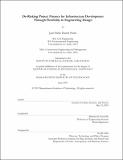| dc.contributor.advisor | Richard de Neufville. | en_US |
| dc.contributor.author | Duarte Pardo, Juan Pablo. | en_US |
| dc.contributor.other | Massachusetts Institute of Technology. Institute for Data, Systems, and Society. | en_US |
| dc.contributor.other | Technology and Policy Program. | en_US |
| dc.date.accessioned | 2019-09-16T18:17:09Z | |
| dc.date.available | 2019-09-16T18:17:09Z | |
| dc.date.copyright | 2019 | en_US |
| dc.date.issued | 2019 | en_US |
| dc.identifier.uri | https://hdl.handle.net/1721.1/122093 | |
| dc.description | This electronic version was submitted by the student author. The certified thesis is available in the Institute Archives and Special Collections. | en_US |
| dc.description | Thesis: S.M. in Technology and Policy, Massachusetts Institute of Technology, School of Engineering, Institute for Data, Systems, and Society, 2019 | en_US |
| dc.description | Cataloged from student-submitted PDF version of thesis. | en_US |
| dc.description | Includes bibliographical references (pages 105-112). | en_US |
| dc.description.abstract | An approach to de-risking infrastructure projects and increasing their bankability is proposed, where flexible design is used to complement traditional Public-Private Partnerships (PPPs) under Project Finance schemes. By definition, forecasts of future project performance will 'always' be wrong in that actual future demand 10 years after the planning phase almost always differs from the forecasts. The potential divergence between predicted and actual demand becomes crucially important if the project's costs are to be recovered from the revenue stream it is supposed to generate. Whereas traditional financing schemes rely exclusively on contractual terms to reduce risks to lenders, an engineering-based framework to mitigate demand and credit risks is proposed as a complement to current approaches. This thesis presents in detail how the use of flexibility in engineering design could be implemented to de-risk PPPs and increase their bankability. | en_US |
| dc.description.abstract | A strategic planning process that recognizes the uncertainty surrounding future conditions and prepares to accommodate them at the lowest cost is the key to de-risk a project technically. This will provide an effective tool to manage demand risk and fully realize the potential of PPPs while scaling down the need for credit enhancements. Projects with lower value at risk and larger upside potential can maximize finance for development and consolidate much needed pipelines of infrastructure projects that close existing infrastructure gaps. To illustrate the proposed process, the de-risking effect of airline involvement in airport planning and design in the United States is analyzed in detail. Airport projects offer considerable scope for flexible design, as passenger buildings and many other airport facilities can easily be designed and implemented in modules. | en_US |
| dc.description.abstract | By completely transferring demand and credit risks to airlines, the financing of airport developments in the United States has overall managed to avoid significant financial project risks. Important lessons can be learned from this interesting model to mitigate demand and credit risks in infrastructure investments. | en_US |
| dc.description.statementofresponsibility | by Juan Pablo Duarte Pardo. | en_US |
| dc.format.extent | 125 pages | en_US |
| dc.language.iso | eng | en_US |
| dc.publisher | Massachusetts Institute of Technology | en_US |
| dc.rights | MIT theses are protected by copyright. They may be viewed, downloaded, or printed from this source but further reproduction or distribution in any format is prohibited without written permission. | en_US |
| dc.rights.uri | http://dspace.mit.edu/handle/1721.1/7582 | en_US |
| dc.subject | Institute for Data, Systems, and Society. | en_US |
| dc.subject | Technology and Policy Program. | en_US |
| dc.title | De-risking project finance for infrastructure development through flexibility in engineering design | en_US |
| dc.type | Thesis | en_US |
| dc.description.degree | S.M. in Technology and Policy | en_US |
| dc.contributor.department | Massachusetts Institute of Technology. Institute for Data, Systems, and Society | en_US |
| dc.contributor.department | Massachusetts Institute of Technology. Engineering Systems Division | |
| dc.contributor.department | Technology and Policy Program | en_US |
| dc.identifier.oclc | 1117709825 | en_US |
| dc.description.collection | S.M.inTechnologyandPolicy Massachusetts Institute of Technology, School of Engineering, Institute for Data, Systems, and Society | en_US |
| dspace.imported | 2019-09-16T18:17:06Z | en_US |
| mit.thesis.degree | Master | en_US |
| mit.thesis.department | ESD | en_US |
| mit.thesis.department | IDSS | en_US |
